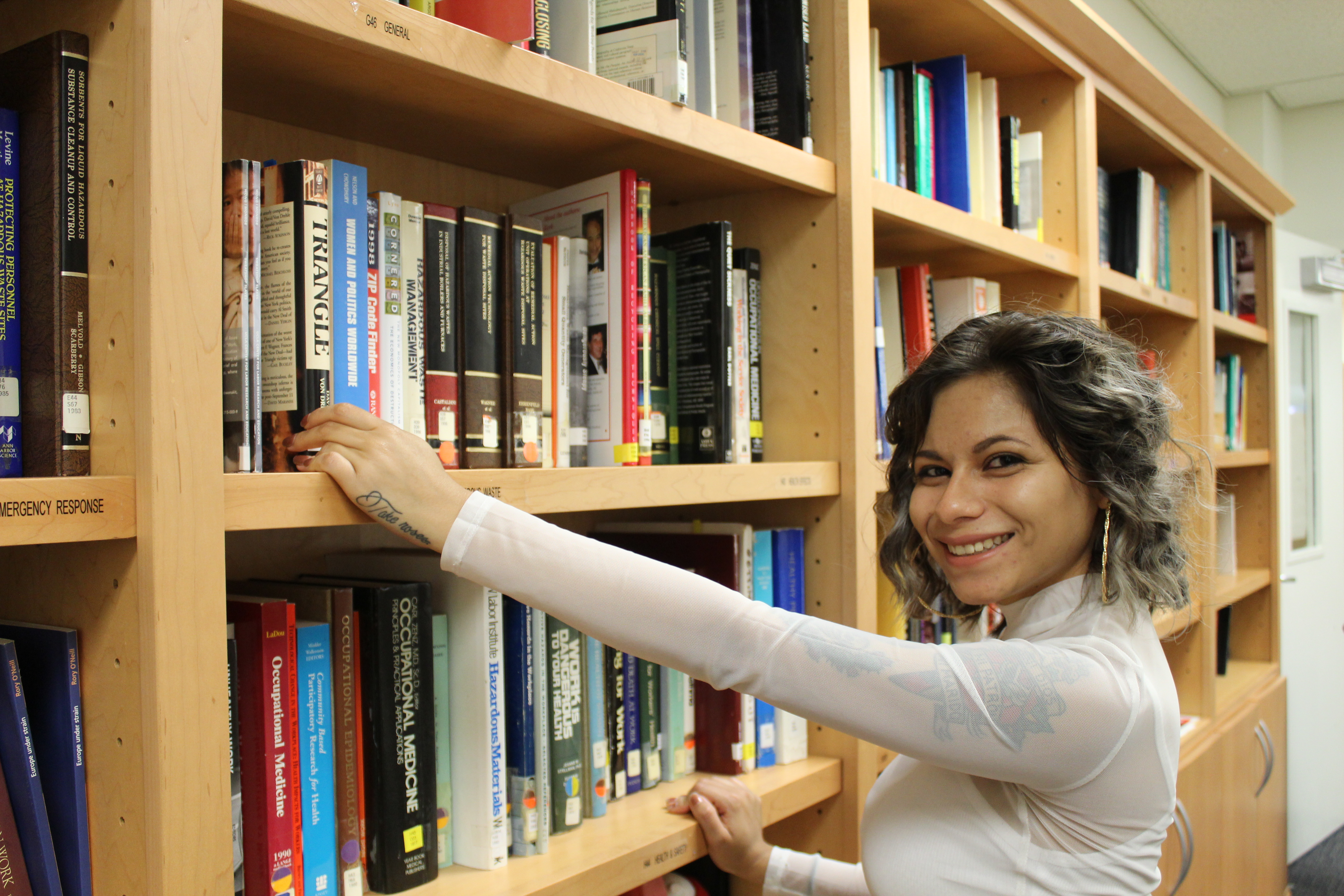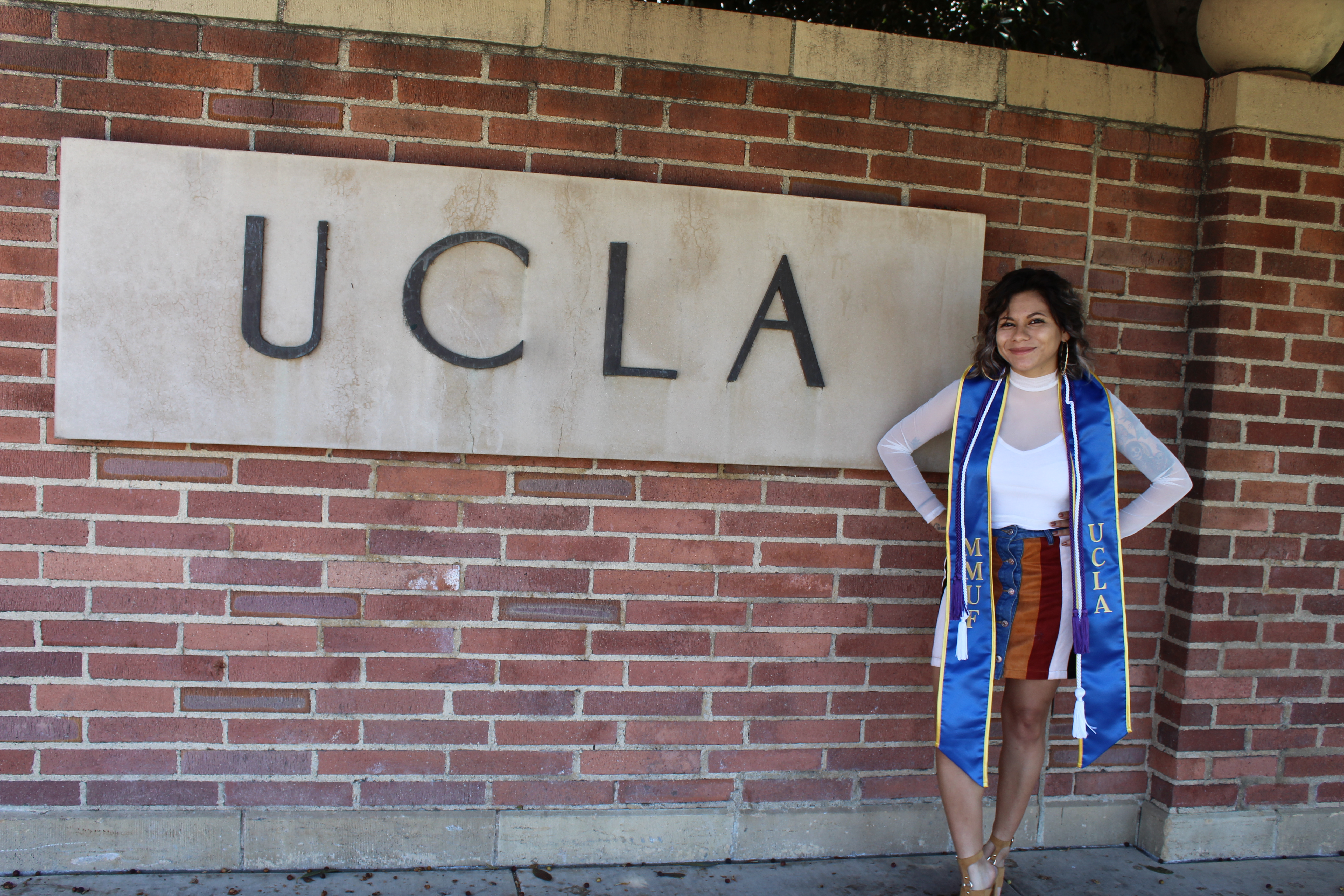2018 Labor Studies Q & A: Feminist Historian with Visionary Plans
Citlalli Chávez-Nava | June 15, 2018
The Labor Studies class of 2018 is composed of numerous dedicated student scholars and activists. Linda Esquivel is among this year’s class, majoring in History with a minor in Labor Studies, she was one of two students speakers at the Labor Studies graduation ceremony this past Saturday. We recently sat down with Linda to learn more about her personal story and future plans.
Can you tell us a little bit about yourself?
I grew up in Bakersfield, where I was raised by my mother. My mother and father migrated from Mexicali, Mexico in the 1990’s. Growing up, my mother cleaned houses to support our family. At 18, I moved away from home to attend San Francisco State University. Due to economic difficulties, I left SF State University after a semester and moved back home. The following year, I enrolled at my local community college, and then transferred to UCLA.
Were you involved in any activities on campus or within the community?
Yes, in my free time, I like to get involved in organizing and marches. I have been supporting work at the Dolores Huerta Organization for a few years.
Were you involved in research at UCLA?
I worked as a research assistant for Professor Kelly Lytle Hernández, a professor in the History Department and Labor Studies program that does research about incarceration and immigration. I assisted Professor Kelly Lytle Hernández with developing her new book. Through this experience, I learned how to research effectively and how to organize research.
What are your own research interests?
My own research focused on anarchist womxn under the mentorship of History and Labor Studies professor, Toby Higbie. My honors thesis was focused on anarchism at the border between Mexico and the United States in early 20th century. This work highlights how the intersection of liberal ideology, discussions of gender/sexuality and reproductive rights contributed to the construction of Maternidad Anarquista (Anarchist Motherhood) in the Mexican Liberal Party. My research was supported by the Mellon Mays Undergraduate Fellowship, the Constance Coiner Scholarship For Labor and Feminist Issues, and the Bradford E. Burns Endowed Scholarship for History Students.
What inspired you to research anarchist womxn?
Though I didn’t realize it until later, my mother’s experience, challenges, and sacrifices played a part in fostering my research interests in anarchist womxn. I grew up among an undocumented community and my mother was was a single mother. We were on welfare, and she also worked very hard cleaning houses to support my sisters and I. Neither the Mexican state nor the US were able to provide my mother with opportunities to get ahead. So the rebelliousness aspect behind this, of my mother having to break the law to survive, this aspect was inspiring to me. I looked towards other anarchist womxn, and the challenges they had to defy to get ahead.
Did some of your Labor Studies professors inspire you?
I was inspired by Professors Virginia Espino and Kelly Lytle Hernández. I admire the work they do and the groundbreaking roles they played in pursuing their PhDs in the world of academia dominated by white men. I admire Professor Kelly Lytle’s work ethic, she is very smart. She’s very productive with her research, she’s published a lot of books. She is also very sweet to me, and I don’t see that often- brains and sweetness.
Professor Virginia Espino also served as a great role model for me. She really emphasized the importance of documenting the stories of working-class people in a responsible way and not in an exploitative way, or solely to further our reputation as scholars. She emphasized we were dealing with real stories, real lived experiences, and how they should be respected. Professor Higbie also inspired me, he was a very good person- you don’t really see that in graduate school.
All of these professors were very supportive and didn’t attempt to draw me away from my focus on anarchist womxn. They always asked me about it, and portrayed a genuine interest in it. Professor Higbie even offered to fund the archival project I will be working on this summer.
Did you experience any difficulties in pursuing higher education? What factors kept you motivated?
Yes I did, navigating funding for college was difficult. I had no college savings, my family grew up poor. We lived paycheck to paycheck. When I contemplated pursuing higher education, I felt limited by my economic circumstances. I knew about FAFSA, but I didn’t know if I would receive enough funds to get by.
When I was attending San Francisco State University I was struggling financially. I couldn’t even pay the fare for the bus. Instead, I would walk four miles to work and school every day. I was food insecure as well. I had a budget of $30 per month for groceries. This was the point when I realized hard work didn’t mean anything. I always thought hard work meant one could earn a good living and move up in life, but I was working hard, and I was still struggling. It was then that I decided to leave San Francisco State University. After leaving, I went back home and worked for the rest of the school year. I saved some money in the hopes to get back into school but I wasn’t able to, so I enrolled in my local community college.
At this point in my life, I felt that I was not pursuing my goals and that I was not living up to my potential. I wasn’t proud of the fact that I was attending community college, until I made the realization that transfer students had the same abilities and potential as students pursuing the conventional college route. The difference was that community college students face different circumstances in their lives. Now, I am proud of my community college background. My professors there encouraged me to continue pursuing my goals. They mentored me, encouraging me to apply to universities like Harvard and UCLA. I followed their advice, and I became more confident.
What are your plans after graduation?
After graduation, I will be pursuing a PhD in History at the University of Chicago, where I have funding for 5 years. I am going to concentrate on research about anarchists and feminist movements in Latin America. Ultimately, I would like to become a History professor.
How did you decide to pursue a PhD?
I decided to pursue a PhD in History upon taking my first college-level history class. I knew then that I wanted to become a professor, so that I could do what I loved to do – read, research and teach. However, I felt doubts about my ability to pursue a PhD. I felt discouraged by the fact that I hadn’t made it at San Francisco State University. After some reflection, I realized that I had encountered an economic problem there, not an academic problem.
What was the application process like?
When the time came to apply to PhD programs, I experienced another set of trials and hardships. The application process was difficult for me. At the time, I was taking 16-18 units, working, and doing research. Working on the application materials while balancing these commitments was challenging. I also found the demographics in academia discouraging. I attended a conference with people from the academic world and felt discouraged by the atmosphere, those in academia were largely white, pursuing capitalistic research or research in the community just to further their career goals.
I faced an internal conflict about this, questioning whether I could fit into academia, and whether I should pursue a PhD given that my community would think I was “selling out”. I questioned the purpose of pursuing a PhD, what it meant to me at a personal level and at a larger societal level. I knew that pursuing a PhD would make me feel lonely, alone within the academic world because I see myself as an outlier among them, and alone among my family and friends because they’d see me differently and treat me differently.
I did not want to be deemed more special than them, or with more worth.
Ultimately, I decided that I was capable of entering the academic world, and that I would try to live in the middle ground between academia and my community – however lonely that world might be for me.
What hashtags describe your experience as a Labor Studies Minor at UCLA?
#Organizing, #Bread&Roses
What is you favorite Labor Studies Minor memory?
I enjoyed participating in the International Workers Day march. I missed the poster-making session so I headed to Pershing Square and when I got there I saw all the women in the Labor Studies program professors, students, staff. It was a great atmosphere to be in, there was a feeling of camaraderie among us, and we were like “let’s all do this!”
What quote describes your academic journey?
“Learning to celebrate successes and defeats when organizing communities.”



